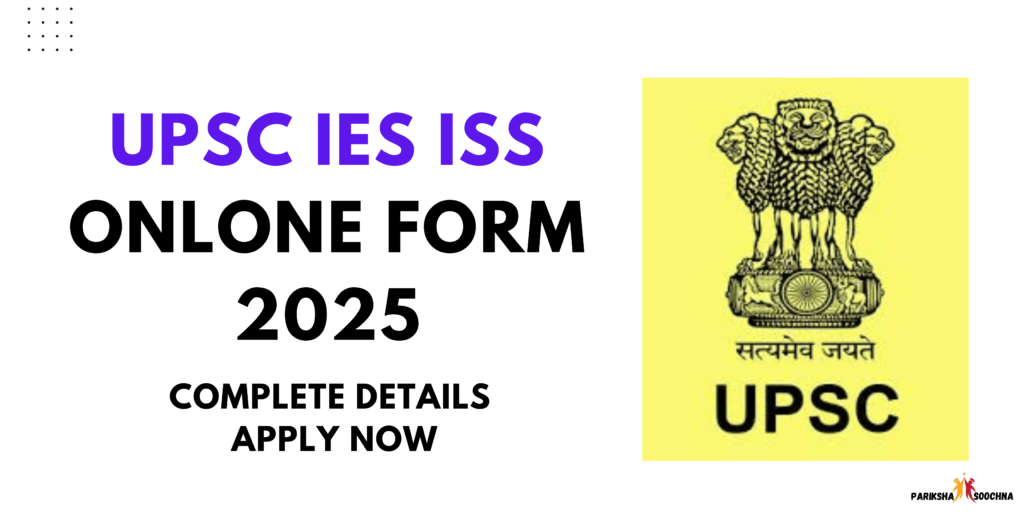
The Union Public Service Commission (UPSC) conducts the Indian Economic Service (IES) and Indian Statistical Service (ISS) examinations annually. These prestigious exams offer an opportunity to work in India’s economic and statistical planning sectors, playing a vital role in shaping national policies.
This blog provides an in-depth guide to UPSC IES 2025, including UPSC IES eligibility, syllabus, exam dates, preparation strategies, and result updates.
What is UPSC IES and ISS?
The Indian Economic Service (IES) and Indian Statistical Service (ISS) are specialized civil services in India.
- IES Officers work in various government departments, focusing on economic policy, analysis, and research.
- ISS Officers handle data collection, statistical research, and implementation of national surveys.
Both services are crucial for economic planning, policy formulation, and statistical data analysis in India.
UPSC IES Eligibility Criteria
To apply for UPSC IES 2025, candidates must fulfill the following criteria:
1. Educational Qualification
- For IES: A postgraduate degree in Economics, Applied Economics, Business Economics, or Econometrics from a recognized university.
- For ISS: A bachelor’s degree with Statistics, Mathematical Statistics, or Applied Statistics as one of the subjects, or a master’s degree in these disciplines.
2. Age Limit
- Minimum age: 21 years
- Maximum age: 30 years (as of August 1, 2025)
- Age relaxation:
- OBC: 3 years
- SC/ST: 5 years
- PwD: 10 years
3. Nationality
Candidates must be:
- A citizen of India, or
- A subject of Nepal/Bhutan, or
- A Tibetan refugee who came to India before January 1, 1962.
UPSC IES Exam Date 2024
The UPSC IES 2024 exam is expected to be conducted in June 2024. The exact dates will be announced in the official UPSC notification. Candidates should regularly check the UPSC website for updates.
How to Apply for UPSC IES 2025?
Step 1: Registration
- Visit the official UPSC website and complete the One-Time Registration (OTR).
Step 2: Fill Out the Application Form
- Enter your personal details, educational qualifications, and category details correctly.
Step 3: Upload Required Documents
- Passport-size photo
- Signature
- ID proof
Step 4: Pay the Application Fee
- General/OBC: ₹200
- SC/ST/PwD/Female Candidates: Exempted
Step 5: Submit the Form
- Review your details and submit the application.
UPSC IES and ISS Exam Pattern
The UPSC IES 2025 exam consists of two stages:
1. Written Examination
The written exam has six papers for both IES and ISS:
| Paper | Marks | Duration |
|---|---|---|
| General English | 100 | 3 hours |
| General Studies | 100 | 3 hours |
| Economics/Statistics Paper-I | 200 | 3 hours |
| Economics/Statistics Paper-II | 200 | 3 hours |
| Economics/Statistics Paper-III | 200 | 3 hours |
| Economics/Statistics Paper-IV | 200 | 3 hours |
- Total Marks: 1000
- Negative Marking: Yes, for incorrect answers in objective-type questions.
2. Personality Test (Interview)
- Candidates who qualify the written exam are called for an interview of 200 marks.
- It assesses communication skills, decision-making ability, and subject knowledge.
UPSC IES Syllabus 2025
1. UPSC IES Syllabus
- Microeconomics and Macroeconomics
- Public Finance and Monetary Economics
- International Economics and Growth Models
- Indian Economy and Economic Reforms
- Environmental and Industrial Economics
2. UPSC ISS Syllabus
- Probability and Statistical Methods
- Sampling Theory and Estimation
- Linear Models and Official Statistics
- Economic Statistics and Time Series Analysis
- Survey Methods and Demographic Techniques
Aspirants should refer to NCERT books, reference guides, and previous years’ question papers to prepare effectively.
Preparation Tips for UPSC IES 2025
1. Make a Study Plan
- Cover all subjects systematically.
- Allocate time for revision and mock tests.
2. Read Standard Books
- Economics: Dornbusch & Fischer, M.L. Jhingan
- Statistics: SC Gupta, Gupta & Kapoor
3. Solve Previous Year Papers
- Helps in understanding exam trends.
4. Take Mock Tests
- Time management is key in this exam.
5. Stay Updated on Current Affairs
- Read newspapers like The Hindu, Indian Express.
- Follow economic policies and reports.
UPSC IES Admit Card and Exam Centers
- The UPSC IES 2025 admit card will be released three weeks before the exam.
- Candidates should download it from the official UPSC website.
Exam Centers
The UPSC IES and ISS exam is conducted in multiple cities across India. Candidates should select their preferred center while filling out the application form.
UPSC IES Result 2024
- The UPSC IES result 2024 will be declared on the official website.
- Candidates can check their result by entering their roll number in the result PDF.
Selection Process After Result
- Qualified candidates will be called for an interview.
- After the interview, the final merit list will be prepared.
- Selected candidates will undergo training before appointment.
Common Challenges and How to Overcome Them
1. Difficulty in Covering the Syllabus
- Make short notes for quick revision.
2. Time Management Issues
- Allocate time for each subject and follow a daily schedule.
3. Handling Exam Pressure
- Practice mock tests and stay physically active.
Conclusion
The UPSC IES and ISS exams offer a golden opportunity to join India’s economic and statistical services. With dedicated preparation, effective strategies, and smart study plans, candidates can successfully clear these exams and secure a bright future.
Best of luck with your UPSC IES 2025 journey!
1. What is the difference between IES and ISS?
IES deals with economic policymaking, while ISS focuses on statistical analysis.
2. When is the UPSC IES exam date 2024?
Expected in June 2024.
3. How can I check my UPSC IES result 2024?
Results will be available on the UPSC official website.
4. What is the UPSC IES eligibility for 2025?
Candidates must have a postgraduate degree in Economics or related fields.
5. How many attempts are allowed for UPSC IES?
- General: 6 attempts
- OBC: 9 attempts
- SC/ST: Unlimited attempts (till age limit)

